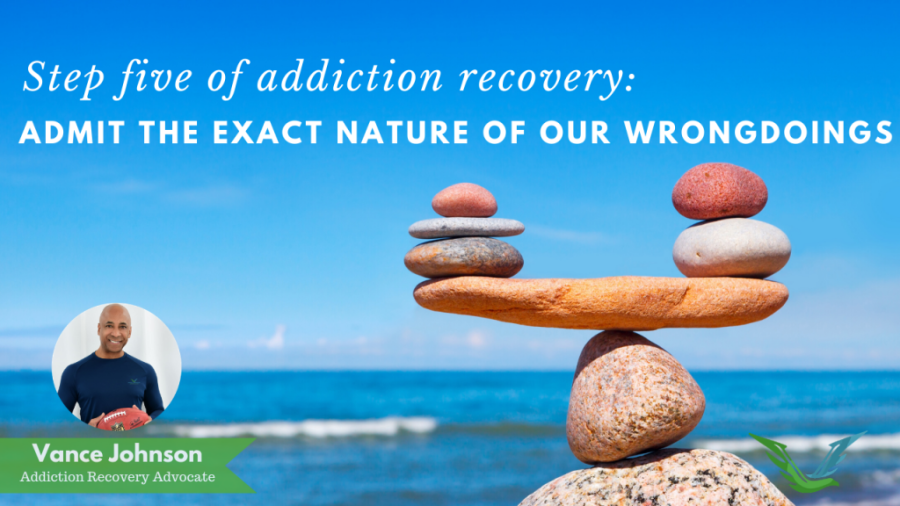
Hey friends, this is Vance Johnson, former NFL athlete and current recovery advocate for the Vance Johnson Recovery Center. We’ve already covered the fourth step of the 12 steps, and now I want to discuss the fifth step, where we, “Admitted to God, to ourselves, and to another human being the exact nature of our wrongs.” Let’s talk about what it means to admit our wrongs, and what you’ll need to do for this step.
The fifth step is potentially one of the more frightening steps, because it’s time to air out our dirty laundry. In the fourth step, we prepared by writing down our moral inventory: all of those cringe-worthy memories and secrets that addicts deal with by using. Now it’s time to free yourself of those secrets.
This step is relatively straightforward. You must admit your wrongs to God first, who already knows your secrets and memories. Once you speak with God, it becomes easier to be honest about these experiences with yourself. You probably handled most of that pain in step four. Then it’s time for you to be honest with another human being. This can be your therapist, sponsor, or even a minister of your choosing. During my time with the fifth step, I spoke with a therapist during a group session about my biggest wrongdoing.
The day my son, Vaughn, died, he asked me for some help fixing his car. I was selfish and self-serving and told him no. Vaughn was forced to buy a motorcycle instead, and that’s what he was riding when he got hit by a drunk driver. And suddenly my son was gone.
Later, when I was receiving addiction recovery treatment, the guilt and shame I felt telling my therapist and group was too much to bear. So I talked to God about the situation, discussed it with myself to come to terms with the repercussions of my actions. Discussing it again, in a group, felt like a punishment.
As I told my story, I admitted what I’d done when I learned about Vaughn’s death: I went on a bender. I drank, I got high, I did everything I could not to feel that loss. Then, one of my group members stopped me and said, “You celebrated your son’s death.”
And that made me furious and hurt, but I listened to him. He pointed out that I used alcohol and drugs to celebrate: when I won games, weddings, birthdays, every happy event in my life. He was right; I’d treated my son’s death like just another celebration, and I will never forget that. I said this step is straightforward, but I never said it was easy. The fifth step helps you gain a deeper understanding of your wrongdoings by putting a spotlight on them for God, yourself, and others to examine.
After this exercise, I continued to work through my son’s death. Eventually, I came to a point where I found deeper meaning in his passing. It was, after all, because of him that I found my purpose in being a recovery advocate. I vowed to help anyone who I could so that no one would have to go through what my son went through. Not if I could help it.
You Can Overcome Drug and Alcohol Addiction
No matter who you are or what your path to addiction recovery has looked like, I promise you that there is a path to sobriety. At the Vance Johnson Recovery Center, my team and I will do everything in our power to help you recover from your alcohol or drug addiction.
To discuss your treatment options, call our admissions staff at 1-888-82-VANCE. Or, if you have questions and don’t feel comfortable calling, you can fill out our online contact form. Whenever and however you are ready to seek addiction treatment, we’ll be here.
The post Step 5: Admitted to God, to ourselves, and to another human being the exact nature of our wrongs. appeared first on Vance Johnson Recovery Center.
Source
Original Author: Vance Johnson

